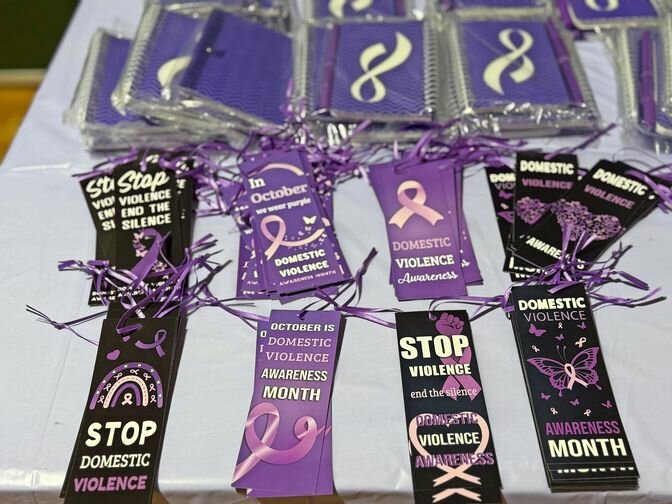OLIVIA YOUNG
In recognition of National Domestic Violence Awareness Month, nonprofit Kingsbridge Heights Community Center, KHCC, hosted an event on Oct. 9 aimed at providing resources and support for survivors.
Domestic violence is commonly associated with a relationship between two people who are having sex, known as intimate partner abuse. But it extends far beyond that — children, elderly relatives, roommates or anyone in a shared domestic space can be a victim of abuse. Abuse isn’t limited to physical harm either. It can be financial, psychological or verbal.
In 2024, the 50th Precinct — which patrols Riverdale, Fieldston, Kingsbridge, Spuyten Duyvil and Marble Hill — reported 981 domestic violence complaints. The 52nd, which covers parts of Kingsbridge, reported more than double that at 2,240 complaints according to the New York Police Department.
Based on a 2023 report from the New York State Office for the Prevention of Domestic Violence, the Bronx reported 11,623 domestic violence survivors — 27 percent of the city total and the highest rate of any borough.
KHCC staff members set up booths on either side of the room, each table with a unique activity or set of resources. Several tables had art supplies laid out for children or adults, such as coloring books or face-mask painting. Some had informational pamphlets that described stalking, sexual assault, consent and coercion, while others offered raffle prizes and self-care resources.
At the first table was Brittany Chambers, coordinator for KHCC’s Enough is Enough program, which specializes in sexual abuse on college and university campuses. Chambers visits sites across the city and presents workshops to students and staff on what healthy love looks like, gender-based violence and Title IX.
Title IX is a civil rights law that says if a school is federally funded, it must ban sex-based discrimination, which extends to sexual violence. If a person reports an incident, the school legally must protect them against retaliation, offer support like counseling or schedule changes, and investigate the allegations.
“I went through my own domestic violence event,” Chambers said. “I never had the proper resources, I never had the proper help, and nobody was there to really guide me through it. Being able to be in this role … It’s very gratifying to me.”
KHCC offers long-term treatment resources, including several forms of therapy like art, family and group as well as prevention training and help filling out forms with the NYC Office of Victim Services.
Trauma manifests in the body, which means emotional care and physical care go together. One table had small cards filled with mindful affirmations, such as “I will accept my feelings,” or “I appreciate today.”
Others listed self-care tips and grounding techniques, like to take a short walk, or journal for 15 to 20 minutes. There were also fragrant eucalyptus and peppermint essential oils, amongst others, intended to soothe the body.
Giselle Lopez, a child and family therapist, focused on informing young adults at the gathering. The center prepared an activity for teens that helps distinguish what healthy traits are in a relationship such as one person having access to the other’s social media passwords or location.
For some teens, especially those with a Hispanic background, Lopez said they are influenced by their parents’ beliefs. Specifically, the concept of “machismo,” or an aggressive form of hypermasculinity.
“Sometimes all of that is kind of imposed on us,” Lopez said. “Kids grow up thinking that’s normal, and they usually follow it.”
Karen Hermita, a receptionist at KHCC’s Changing Futures program, which focuses on child sexual abuse and domestic violence, said she has also noticed stigma in Hispanic households, where verbal abuse isn’t treated as seriously as physical.
But stigma touches every survivor regardless of culture. Fadah Heimed, an intern, said she’s noticed those who suffer abuse can hesitate to reach out for help due to self-blame.
“Some people don’t want to go to therapy because they feel like they’re admitting that it’s their fault,” she said. “Events like this help create awareness and help you feel like you’re not alone and you can speak to someone.”
In front of Hermita and Heimed were small packets of flower seeds and other plants, and pots filled with dirt. This, Hermita said, was a metaphor for recovery after surviving abuse.
“You find a plant and watch it grow, and it’s the same way for a person too,” she explained. “You’re also seeing yourself heal through the mirror — how much you have grown than how you were before.”
Contact Safe Horizon at 1-800-621-3673, the National Suicide Prevention Hotline at 988, or the KHCC Rape Crisis Center Hotline at 718-884-0700 ext. 193 if in need of help.
Keywords
KHCC domestic violence event,
Bronx survivor support,
National Domestic Violence Awareness Month,
Kingsbridge Heights Community Center,
Bronx abuse prevention resources,
Enough is Enough program,
domestic violence Bronx statistics

